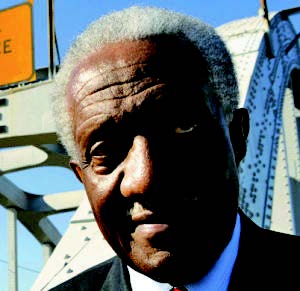
Dr. Frederick D. Reese was born on November 28, 1929, in Dallas County, Alabama. Reese, a minister, educator, and civil rights activist, became a national figure on March 7, 1965. On that infamous day Reese and hundreds of other activists attempted to march across the Edmund Pettus Bridge in Selma, Alabama. The day would come to be known as Bloody Sunday after protestors were beaten and sprayed with tear gas. After Bloody Sunday, Reese received a call from Martin Luther King, Jr. offering his support, and on March 21, 1965, 300 protestors (the number of protestors allowed by authorities) began the 50-mile march from Selma’s Brown Chapel AME Church to Alabama’s state capitol in Montgomery. By the time they reached Montgomery on March 25, the number of marchers had swelled to over 25,000. These events eventually led to the passage of the Voting Rights Act, which was signed into law by President Lyndon B. Johnson on August 6, 1965.
Reese graduated from Alabama State University, where he majored in both math and science. He then earned his Masters in Education degree from Livingston University. He also studied at the University of Alabama, Southern University, and Auburn University before receiving his Doctorate of Divinity and an Educational Specialist degree from Selma University.
By the mid-1960s, Reese was the president of the Dallas County Voter’s League, which became the major Selma freedom organization after the State of Alabama banned the NAACP in 1956. Reese was also a member of The Courageous Eight, the name given to the eight trustee board members of the Dallas County Voter’s League in Selma for their work fighting segregation and voting rights in Selma. The Courageous Eight received international attention in the 1960s and became a pivotal point to the Voting Rights Act of 1965 and Civil Rights Act of 1968. Members included Mr. Ulysses Blackmon, Dr. Amelia Boynton-Robinson, Mr. Earnest L. Doyle, Mrs. Marie Foster, Mr. James Edward Gildersleeve, Rev. J. D. Hunter, Dr. Reese, and Rev. Henry Shannon, Jr.
Reese was a teacher at Hudson High School and presided over the Selma Teachers Association. On January 22, 1965, Reese, Margaret Moore, and a few other organizers mobilized almost every African American teacher in Selma to march to the courthouse to register to vote. Their mindset was, “How can we teach American civics if we ourselves cannot vote?” The teachers climbed the steps but were barred from entering to register. They were pushed down the steps twice, the police jabbing them with nightsticks. Officials reportedly urged against the teachers’ arrest, “Don’t arrest these people because what you going do with the 7,000 students that we have running around here when they go back to school Monday?” It was the first time in the Civil Rights Movement that teachers in the South publicly marched as teachers; they were the largest black professional group in Dallas County, and their actions inspired involvement from their students and others who were unsure about participating in demonstrations.
Later, Reese became a principal and a city councilman, serving 12 years on the Selma City Council. He ran for mayor of Selma in 1984, and led a campaign to motivate Walmart executives to hire African Americans as store managers. Reverend Reese served as pastor of Selma’s Ebenezer Missionary Baptist Church for over 50 years.
In 2000, in honor of his civil rights work, a stretch of more than three miles of U.S. Route 80, where he marched to Montgomery, was named the Frederick D. Reese Parkway. The F.D. Reese Christian Academy in Kokomo, Indiana, was also dedicated to him.
On February 24, 2016, Reese received the Congressional Gold Medal on behalf of the Selma to Montgomery marchers. The first Gold Medal was awarded in 1776 by the second Continental Congress to General George Washington. Since the American Revolution, Congress has commissioned gold medals as its highest expression of national appreciation for distinguished achievements and contributions by individuals or institutions.
Resources
- Frederick D. Reese Biography – The Biography.com website http://www.biography.com/people/frederick-d-reese-21415883
- Wikipedia https://en.wikipedia.org/wiki/Frederick_D._Reese
- Honoring Civil Rights Activist Rev. Frederick D. Reese by Rep Terri Sewell http://capitolwords.org/date/2015/06/04/E847-3_honoring-civil-rights-activist-rev-frederick-d-ree/

